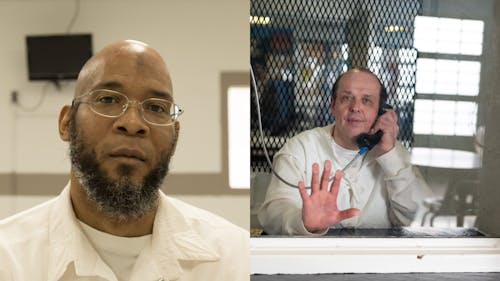CHAUDHURY: Death penalty is unconstitutional

On Thursday, Robert Roberson will be executed for a crime that never occurred.
Prosecutors convicted Roberson in 2002 for the death of his daughter, relying on the disproven "shaken baby syndrome" hypothesis. Finding his daughter, Nikki, unresponsive and on the floor, he brought her to an emergency room. Roberson explained to doctors he found her on the floor, telling them she fell, but they did not believe him.
The doctors did not know Roberson had autism, and doctors decided he was not showing the proper emotions considering the situation. On Feb. 2, 2002, Nikki died.
Later, the Anderson County District Attorney's Office in Texas accused Mr. Roberson of killing his daughter, and he was convicted.
In 2013, the Texas State legislature passed a law allowing convicts to obtain new trials if there is evidence of flawed forensic evidence. Colloquially, this law is called the law banning "junk science" as evidence. Then, in 2016, the Texas Court of Criminal Appeals returned to Mr. Roberson's case.
Still, with Nikki's undiagnosed pneumonia, Roberson's diagnosis discrediting the doctor's testimony, and "shaken baby syndrome" being disproven, the court remained adamant in maintaining Roberson's sentence. Unless the Supreme Court takes Roberson's case, he will be executed.
According to the Death Penalty Information Center, 200 people have been exonerated on death row since 1973, while a 2014 study found that approximately 4 percent of those sentenced to death have been innocent. The fact that any innocent person has been sentenced to death demonstrates that practice should be stopped. The death penalty is barbaric, making the government guilty of the same crimes the death penalty seeks to discourage.
The death penalty has been practiced throughout U.S. history. From hangings to lethal injections, execution is an American tradition. The death penalty is considered protected under the U.S. Constitution's Eighth Amendment, which specifically prohibits "cruel and unusual punishments." It is protected because, despite its status as the cruelest punishment, the death penalty is historically usual.
The historic protection of the death penalty does not mean that people can go out enforcing the same punishments as citizens in the 1700s. A 1910 Supreme Court case, "Weems v. United States," stated that the Eighth Amendment would be analyzed considering "the evolving standards of decency."
This standard was then applied in 1972 to rule the death penalty unconstitutional in the Court case "Furman v. Georgia," which was overturned three years later in "Gregg v. Georgia." If the Court had not decided that sentencing individuals to death was suddenly humane, Roberson would not have wasted more than 20 years of his life just to be punished for a crime that never occurred.
Three core tenets of punishment in Western society are deterrence, rehabilitation and retribution. The death penalty fails to meet each of these goals.
A 2009 study published in the Journal of Criminal Law and Criminology found that approximately 88 percent of criminologists did not believe that the death penalty is a proven deterrent to homicide and that 87 percent believe that abolition of the death penalty would not have any significant effect on murder rates.
Execution prevents rehabilitation. This makes sense, as the death penalty is only applied to individuals considered unable to be rehabilitated.
Retribution is where the death penalty can have merit. The question is whether you would favor these criminals to harbor the guilt of their crime and know they will never be set free or subject to a brutal end. I favor the former, but the more significant issue with the death penalty is that if an inmate is innocent, they may never get the chance to see freedom again.
The "evolving standards of decency" have permitted government execution for too long. As a result, innocent people have been falsely convicted and served the death penalty. The Supreme Court can save innocent lives but refuses to act. Justices have neglected their position to protect the Constitution and have become political actors. They sit atop their throne as unelected officials and care little for their legitimacy.
Roberson is a misunderstood man who has suffered for too long. He has maintained his innocence all these years. So did Marcellus Williams, a man sentenced for killing a woman based on the testimony of two paid witnesses without any DNA evidence. As did Nathaniel Woods, a man sentenced despite his co-defendant Kerry Spencer maintaining that officers beat Woods and pointed a gun at him, so Spencer killed the officers.
Former Justice Thurgood Marshall once said, "In recognizing the humanity of our fellow beings, we pay ourselves the highest tribute." The time for change is now: the death penalty must be ruled unconstitutional.
Shayan Chaudhury is a first-year in the School of Arts and Sciences majoring in philosophy and economics and minoring in philosophy, politics and economics. Shayan Chaudhury’s column, “Keeping up with the Capitol,” runs on alternate Wednesdays.
Columns, cartoons, letters and commentaries do not necessarily reflect the views of the Targum Publishing Company or its staff.
YOUR VOICE | The Daily Targum welcomes submissions from all readers. Letters to the editor must be between 350 and 600 words. Commentaries must be between 600 and 900 words. All authors must include their name, phone number, class year and college affiliation or department to be considered for publication. Please submit via email to oped@dailytargum.com and eic@dailytargum.com to be considered for publication.



